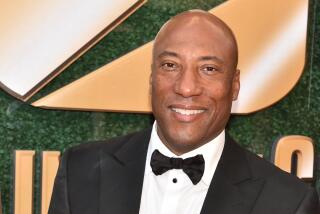Takeover Defense Could Wipe Out Firm’s Net Worth : Unocal Discloses Plan’s Impact
- Share via
Unocal disclosed Wednesday that, if its conditional offer to exchange new debt for half of its shares is successful, the company’s net worth would be wiped out and its income would be substantially reduced.
Unocal, parent of Los Angeles-based Union Oil of California, on Tuesday had announced an offer to exchange up to $6.3 billion of new senior notes for 87.2 million Unocal shares, or about $72 per share. The offer, which will be completed only if the investor group led by Texas oilman T. Boone Pickens is successful in its hostile $54-per-share bid to buy 64 million Unocal shares, was officially launched Wednesday after details were filed in a prospectus with the Securities and Exchange Commission.
Pickens has denounced the exchange offer as “just another poison pill in a new bottle.”
Unocal said the offer is designed to make the offer by Pickens’ Mesa Partners II investor group more difficult to complete and to give shareholders “a fair value” for their holdings.
The Pickens group has proposed completing a merger by exchanging each remaining Unocal share for securities valued at $54. Unocal has rejected Pickens’ offer as “grossly inadequate.”
The exchange offer was authorized by Unocal’s board at a meeting Monday. Unocal said it won’t accept any stock from the Pickens group for exchange.
In the prospectus explaining its exchange offer, Unocal said its long-term debt would have been $7.4 billion instead of $1.12 billion at the end of 1984 if the transaction had occurred in 1984.
Total assets would be unchanged at $10.2 billion, but total liabilities would jump to $10.8 billion from the actual $4.5 billion. As a result, shareholders’ equity or net worth (assets minus liabilities) would have been a negative $584.1 million at the end of 1984 instead of the actual year-end shareholders’ equity of $5.7 billion.
Net earnings would have been $291.4 million at the end of 1984 (assuming a $409-million decrease in taxes on consolidated income) had the transaction occurred that year rather than the actual $700.4 million that Unocal earned in 1984. Interest expenses would jump to $949.7 million after the exchange from $131.8 million at the end of 1984.
Unocal said that, although the exchange would create a shareholders’ deficiency for accounting purposes, “the company believes that even after giving effect to the exchange of securities for shares in the company offer, the fair market value of the company’s assets will be significantly in excess of its liabilities.”
Unocal estimated that the costs of the offer could be $29.5 million, including a possible payment of $23 million to Unocal’s financial advisers--Dillon, Read & Co. and Goldman, Sachs & Co.--for fees and expenses. The two companies will receive a total of $3 million, plus $5.5 million every 90 days if no one buys at least 50% of Unocal’s stock.
Under the plan, Unocal will exchange each share for three debt securities with a total face value of $72, including:
- $20 principal amount of 14% senior secured notes due 1991. The interest would be paid semiannually.
- $32 principal amount of floating senior secured notes due 1991. The notes would carry a 12.125% interest rate until Aug. 15, 1985. Then the interest rate would be 325 basis points over the three-month London Interbank Offered Rate but not less than 6%.
- $20 principal amount of senior secured extendable notes due 1997, which would carry a 13.5% interest rate until May 15, 1988. After that, the interest rate would be changed every three years based on a percentage of the three-year Treasury rate.
Analysts said that the interest rates on the notes are fairly attractive and that the notes probably will trade at or near face value.
Herbert Hart, an analyst with S. G. Warburg, Rowe & Pitman, Akroyd of San Francisco, said the market value of the notes and potential impact of the exchange “are pretty academic at this point. I really think the chances of Pickens getting his 51% are getting fewer and fewer.
“It looks like he’s got a real uphill fight,” Hart said.
More to Read
Inside the business of entertainment
The Wide Shot brings you news, analysis and insights on everything from streaming wars to production — and what it all means for the future.
You may occasionally receive promotional content from the Los Angeles Times.










